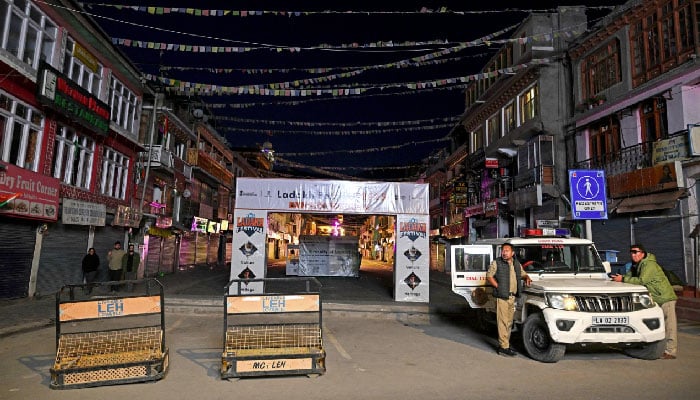Politics
Security tight after deadly autonomy protests in Indian-occupied Ladakh

- Protesters torch police vehicle, Bharatiya Janata Party offices.
- Protests organised in solidarity with activist Sonam Wangchuk.
- Modi government split Ladakh off from IIOJK in 2019.
Indian police patrolled the northern city of Leh on Thursday, a day after protests demanding greater autonomy for the Himalayan territory of occupied Ladakh turned deadly when security forces opened fire.
At least five people were killed and about 100 wounded, including 30 police officers.
The city — usually bustling with tourists — appeared deserted, with most main roads blocked by coils of razor wire and guarded by police in riot gear, an AFP reporter said.
A doctor at Leh’s SNM Hospital said they had treated about 100 injured people since Wednesday, some of them police.
“We have operated upon six injured people, three of them had bullet injuries and others internal bleeding in the chest and broken ribs,” said the doctor, who asked not to be identified.
Protests erupted on Wednesday, with crowds demanding greater autonomy in the sparsely populated, high-altitude desert region that is home to some 300,000 people and which borders China and Pakistan.
India’s Ministry of Home Affairs said that an “unruly mob” had attacked police, reporting in a statement issued late on Wednesday that “more than 30” officers were injured.
Protesters torched a police vehicle and the offices of Prime Minister Narendra Modi’s Hindu-nationalist Bharatiya Janata Party (BJP), while officers fired tear gas and used batons to disperse crowds.
“In self-defence, police had to resort to firing, in which unfortunately some casualties are reported,” the statement said. It did not give any details about deaths.
However, a police officer told AFP that “five deaths were reported after the protests”. The officer spoke on condition of anonymity because he was not authorised to talk to journalists.
Thinley, 33, who runs an automobile spare parts shop in Leh, was shot in the leg.
“We are exhausted by the government by not listening to our demands”, Thinley, who gave only one name, told AFP from his hospital bed.
Jigmet Stanzin, 23, said he was injured when he tried to throw back what he thought was a tear gas canister.
“It exploded and shattered my hand,” he said.
‘Betrayed and angry’
A police unit guarded the vandalised BJP office on Thursday, alongside the wreckage of a burned security vehicle.
Paras Pandey, 27, an Indian tourist, walked alone along the highway out of Leh with a heavy backpack, looking for a ride out.
“Everything is shut. I couldn’t get food since yesterday,” Paras said. “All I could see yesterday was chaos, smoke, and broken vehicles.”
Around half of Ladakh’s residents are Muslim and about 40% are Buddhist.
It is classed as a “Union Territory” — meaning it elects lawmakers to India’s parliament but is governed directly by New Delhi.
Wednesday’s demonstrations were organised in solidarity with prominent activist Sonam Wangchuk, who had been on hunger strike demanding either full federal statehood for Ladakh or constitutional protections for its tribal communities, land and fragile environment.
New Delhi said the protests were “instigated by his provocative speeches” and pointed out that efforts were continuing to discuss its governance.
Modi’s government split Ladakh off from Indian Illegally Occupied Jammu and Kashmir in 2019, imposing direct rule on both.
New Delhi has yet to fulfil its promise to include Ladakh in the “Sixth Schedule” of India’s constitution, which allows people to make their own laws and policies.
Omar Abdullah, chief minister of IIOJK, said people in Ladakh felt “betrayed and angry”.
India’s army maintains a large presence in occupied Ladakh, which includes disputed border areas with China. Troops from the two countries clashed there in 2020, killing at least 20 Indian and four Chinese soldiers.